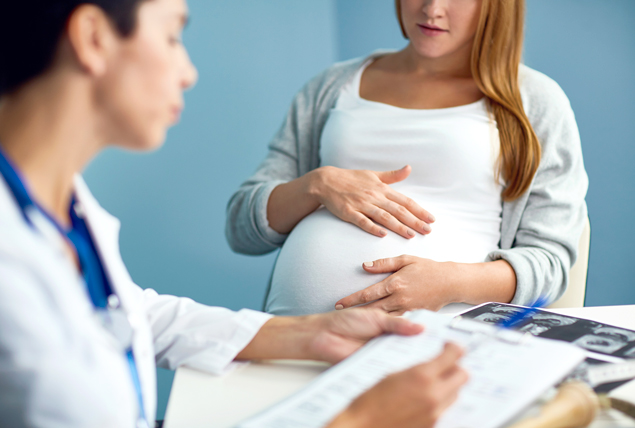How to Have a Healthy Pregnancy With Preexisting Heart Disease

Pregnancy can be a demanding time for anyone's heart health. During pregnancy, the heart pumps more blood per minute, so there can be a greater strain on the circulatory system, while labor increases the workload of the heart.
But for people with preexisting heart disease, there are more moving parts involved. Those with a cardiac condition may require more monitoring and extra care from health professionals, starting with preconception.
How does pregnancy affect your heart?
Heart disease can contribute to complications in pregnancy. It is one of the leading causes of morbidity and mortality during gestation and the postpartum time frame.
"You can think of pregnancy like a cardiac stress test or running nonstop for 40 weeks; pregnancy puts a significant strain on the heart as it tries to pump more blood to the growing fetus," said Annalies Denoble, M.D., MSc., an assistant professor and maternal-fetal medicine specialist in the Department of Obstetrics, Gynecology and Reproductive Sciences at Yale School of Medicine, with clinical and research interest in heart disease in pregnancy.
Even a healthy heart can be strained by the extra work in pregnancy, yet women with preexisting heart disease are particularly high risk for pregnancy and postpartum complications, Denoble explained.
"When you get pregnant, your blood volume increases on average 50 percent more than your prepregnancy level. That adds a lot of stress on the heart, causing you to be short of breath [and] retain water in your legs," said Sarah Rosanel, M.D., a cardiovascular specialist and an associate professor at Yeshiva University in New York City who also serves as an attending physician in South Florida.
If you have preexisting cardiac disease, it is imperative to have a cardiologist to monitor you and work closely with your OB-GYN, Rosanel recommended.
What are the risks during pregnancy?
Any pregnancy can carry some risk. But for people with heart disease, medical professionals may see some similarities.
"Some cardiac conditions are inherited and are more likely to run in families. Women with certain heart conditions are more likely to have a baby affected by the same or other heart conditions," Denoble said.
Other risks for the fetus may include:
- A higher chance of preterm birth
- Growth restriction
- Miscarriage
- Stillbirth
Meanwhile, maternal risks could include a higher chance of complications such as:
- Hypertensive disorders of pregnancy, such as preeclampsia
- Cesarean delivery
- Hemorrhage
- Severe complications, such as severe maternal morbidity
- Death
"We also think about the possibility that the stresses of pregnancy could cause a decline in heart function that may not recover after the pregnancy," Denoble added.
Some of the cardiac complications include:
- Heart failure
- Stroke
- Heart attack
- Blood clots
- Aortic dissection
Can you have a healthy pregnancy with heart disease?
Most patients with preexisting heart disease can successfully become pregnant and even have a healthy, uneventful pregnancy, Denoble said. Although there are a few conditions in which pregnancy is discouraged, she highlighted that most people benefit from medical care during pregnancy.
"Pregnant women with heart disease should have a close follow-up with their cardiologist [and] keep an ongoing discussion about when and if to have children," Rosanel recommended. "When pregnant, patients with preexisting cardiac conditions should have regular monitoring."
Similarly, Denoble recommended a preconception consultation with a specialist in high-risk obstetrics or maternal-fetal medicine. This medical professional can review the patient's health history and may order relevant tests to evaluate the heart's status and function.
Once the physician possesses details on the patient's current heart health and past health history, the physician can better advise on any associated pregnancy risks. The physician can design a plan with the patient to help ensure a safe pregnancy.
Once pregnant, some patients may benefit from the care of a multidisciplinary maternal cardiac team, according to Denoble. This team may include OB-GYNs, cardiologists, anesthesiologists, cardiothoracic surgeons, nurses and midwives to ensure a safe pregnancy, delivery and postpartum period.
Will you need to change your heart medications?
If you're wondering whether you may need to change heart medications, the short answer is yes, sometimes, depending on the type of medication you take.
"If a woman of childbearing age has cardiac conditions and takes medication, such as a statin or certain blood pressure medications, she needs to change her medication regimen before she gets pregnant because a lot of medicines are teratogenic to a fetus," Rosanel explained, referring to the possibility of abnormalities.
Denoble warned that no one should ever stop their heart medication without the supervision of a healthcare professional. It's a dangerous move. It is extremely important to discuss any changes in your health with your healthcare providers and follow their instructions, Denoble said.
Schedule a preconception visit so your doctor can evaluate your cardiac medication and, if necessary, swap out with a pregnancy-friendly medication.
Will you need to have a C-section?
Childbirth can be a particularly stressful time for the heart. Some patients with preexisting heart conditions may require a special plan for safe delivery and extra monitoring of the mother and baby.
"We actually recommend vaginal delivery for many of our patients with preexisting heart disease," Denoble said. "Cesarean delivery is usually reserved for those patients with a serious or sudden complication related to their heart disease, like heart failure, or if they have another obstetric reason for a cesarean delivery."
Cesarean section can increase the likelihood of certain complications of childbirth, such as hemorrhage and infection, Denoble explained. Although cesarean section may be necessary in some cases, she clarified that healthcare providers do not make the decision lightly but adapt to each case and alongside the patient.
When vaginal delivery is considered safe but long-term pushing may be too stressful for the heart, doctors could recommend a different delivery method. For example, an assisted second stage is somewhere between a spontaneous vaginal delivery and a cesarean delivery. It can help to avoid the complications of major surgery, Denoble shared.
"This is where we help deliver the baby using the assistance of a vacuum or forceps with minimal pushing from the mother," Denoble added.
It's not uncommon. Assisted vaginal delivery occurs in 3 out of 100 vaginal deliveries, according to the American College of Obstetricians and Gynecologists.
When is maternal morbidity a concern?
Denoble has examined the risks of severe maternal morbidity, or SMM, in women with preexisting heart disease. These unanticipated short- or long-term health problems result from labor and delivery.
In a 2022 study published in American Heart Journal, Denoble and her co-authors found most preexisting heart disease increases the risk of delivery and postpartum complications to some degree.
"However, the degree of the risk depends on the underlying heart condition, with more mild preexisting heart conditions conferring a 1.9-fold increased risk of severe maternal morbidity during the delivery hospitalization and the more moderate-to-severe heart conditions conferring a nearly sixfold increased risk of severe maternal morbidity, compared to women without heart disease," Denoble concluded in her research.
"In this study, almost one-quarter of women with more moderate-to-severe heart disease experienced severe maternal morbidity during their delivery hospitalization. This was compared to only 1.6 percent of those without heart disease," Denoble added.
Although this research may sound alarming, don't panic. This study helps highlight why it's so important for people with heart conditions to meet with their doctors at every stage in the pregnancy journey.
The bottom line
A healthy pregnancy is possible, even for people with heart disease.
Seek your doctor's advice, get the tests you need and discuss potential medication changes before becoming pregnant. You and your medical team will have the necessary information to make the best decisions regarding your health and that of your baby.


















